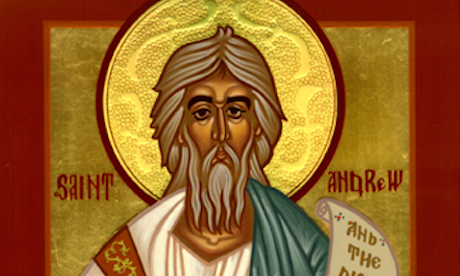For all his ubiquity, the biblical Andrew is a shadowy figure.
In one of a handful of scriptural references, he is the apostle who tells Jesus that five loaves and two fishes won’t feed 5,000 people; a miracle soon proves otherwise.
Like other widely honoured saints, Andrew himself defies the laws of finitude by appealing to so many people in so many places.
Thirtieth November is a big feast day for Scotland, Romania, Cyprus, the Greek port of Patras and for Christians in Istanbul; in 13 days’ time, the same feast will be celebrated in places where the old church calendar is kept, such as Russia and Ukraine.
And whenever it is observed, the annual feast day of Saint Andrew brings reminders that the first apostle of Jesus Christ, one of two fisherman brothers, can still create political waves.
Take Scotland. Andrew has been that country’s official patron saint since 1320, and he was venerated there for centuries before that.
The diagonal white cross of Saint Andrew was flying defiantly in Edinburgh today, although yesterday’s helicopter crash in Glasgow cast a pall over the commemorations.
Alex Salmond, head of the Scottish Nationalists, used the national holiday to stir patriotic feeling ahead of next year’s independence ballot. Even his reaction to the helicopter crash mentioned the saint; he said today was a good moment to take pride in Scotland’s resilience.
Meanwhile David Cameron has hoisted the Scottish emblem over his prime-ministerial residence in London and issued a Saint Andrew’s message with the opposite intention: to remind the Scots of how well they have done as Brits. Continue reading.
Source: The Economist
Image: Form Ministry
Additional readingNews category: Features.




